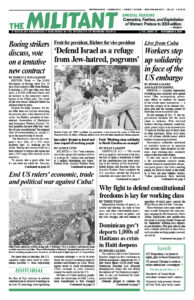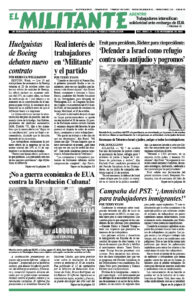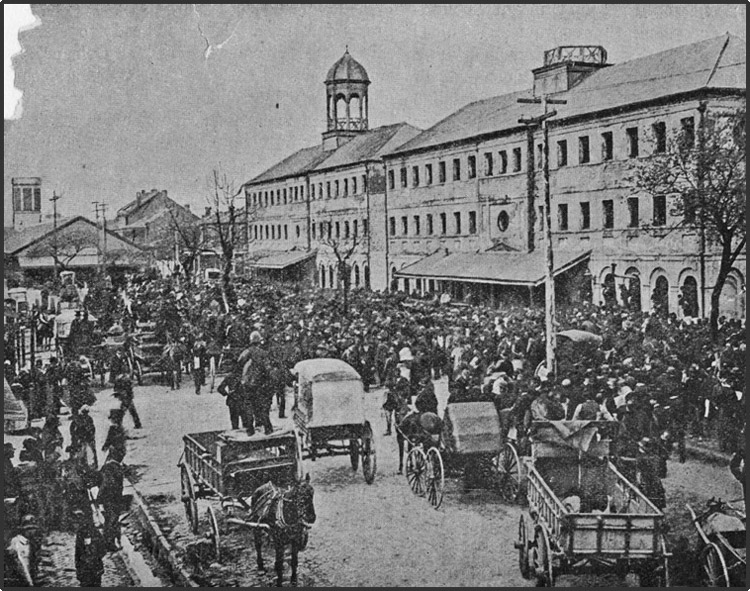The attempts by liberals and the middle-class left to eradicate Columbus Day, a national holiday in October since 1937, honoring 15th-century explorer Christopher Columbus, along with statues and other tributes to Columbus, stepped up this year. These ahistorical political forces say the holiday should be renamed “Indigenous Peoples’ Day.”
In 2021 President Joseph Biden issued an official proclamation creating Indigenous Peoples’ Day, a move backed by Democratic presidential candidate Kamala Harris and other capitalist politicians, as they attempt to portray a more “politically correct” capitalist rule.
In many cities, governments have provoked confrontations with Italian American communities over the holiday and local statues of Columbus. Dozens of the statues have been defaced, removed or destroyed. And Columbus Day has been “cancelled” on many college campuses.
Similar actions have been carried out by some governments in Latin America and the Caribbean. The government of Trinidad and Tobago announced it would redraw the nation’s coat of arms, replacing Columbus’ ships — the Nina, Pinta and Santa Maria — with a steel drum.
In its July 13, 2020, issue of the Militant, Managing Editor Terry Evans wrote an article entitled “Destruction of statues seeks to erase history we need to know.” It said, “Behind the destruction and removal of monuments lies the notion that by erasing symbols from the past, reflecting different stages of class development, you can ‘cancel’ them and pretend they didn’t happen.
“Knowing the real history of past class struggles is key to charting a road forward. Along that road working people will decide what statues and other historical monuments we want to keep and where, and what new ones to erect.
“We don’t need small self-appointed groups imposing their own will on others tearing down statues, putting barriers in front of working people learning from our history, and gaining confidence in what we can become.”
He pointed out that working people today can’t judge past civilizations by comparison with conditions today, many the result of mighty class struggles and revolutionary transformations. Things that we reject today have accompanied important social advances in the past. That’s true of Columbus’ “discovery” of the Americas.
Holiday amid anti-Italian violence
Columbus Day was originally called Discovery Day, a national celebration to be held Oct. 21, 1892, declared by President Benjamin Harrison on the 400th anniversary of Columbus’ landing in the Bahamas.
This came amid anti-immigrant violence aimed at soaring numbers of Italians coming to the U.S. in search of jobs and a new life. In 1880 Italian immigration was 44,230. In 1890 it had jumped to 484,027. The Ku Klux Klan and other racist and nativist groups went after Italians — as well as the Irish — because they were Catholic. In 1891, 11 Italian immigrants were captured in New Orleans by a mob led by many of the city’s political leaders, and then lynched.
Harrison, whose reelection campaign was faltering, had no special interest in Italian or other immigrants but hoped to reap a new pool of political support by appealing to Catholic voters. He also appealed to the Irish, as an 1887 speech shows: “What Ireland needs is not coercion, is not the constable, is not the soldier with musket and bayonet. What Ireland needs is liberal laws, that emancipate her people from the results of long centuries of ill government.”
Columbus and the Americas
The four voyages of Columbus and his crews to the Caribbean and South America between 1492 and 1504 opened a door to the advancement of human history, as well as a clash of social systems that begat brutal colonial enslavement.
Armando Hart, a central leader of the Cuban Revolution and longtime minister of culture, gave an interview to Granma published in February 1991. He explained, “The Europeans made these discoveries in order to expand trade and the known world. These events, in and of themselves, were revolutionary events that extended human culture into a dimension unknown until that moment.
“Since the fall of the Roman empire, 1,000 years before, nothing of that magnitude had taken place. Actually, it’s hard to find a more significant event before 1492, and after that date it is comparable to the splitting of the atom.”
But, he stated, “The conquest had three serious consequences: the strategic backwardness in Spain; the annihilation of the indigenous peoples and cultures; and African slavery. These last two phenomena cannot be accepted or justified in any way, today or ever, and we must reject them wholeheartedly.
“The essence of the problem is that with each scientific achievement in the history of man there is a dramatic dichotomy: the possibility for enormous progress in human liberation, on the one hand, and the interests of the decadent classes, on the other,” he said.
“Medieval obscurantism and reactionary interests in Spain overshadowed the prestige and authority of the great discoveries made by Christopher Columbus.”
In October 1992, marking the 500th anniversary of Columbus’ arrival in the Americas, Hart said in Holguín, Cuba, “Before 1492 there was no world in the modern sense. What was the world was only a fragment of the Earth.
“Columbus deserves our respect, deserves to be remembered, because what he really discovered five centuries ago was the road to the world. That discovery was greater than what the Admiral imagined he had found.”
This is what it means to see past events along humanity’s road forward. This is Marxism.
To learn more about the clash between the indigenous societies of the Americas and the social system that was beginning to emerge in Europe in Columbus’ time — capitalism — Militant readers are encouraged to read the book Labor, Nature, and the Evolution of Humanity: The Long View of History, published by Pathfinder Press.


